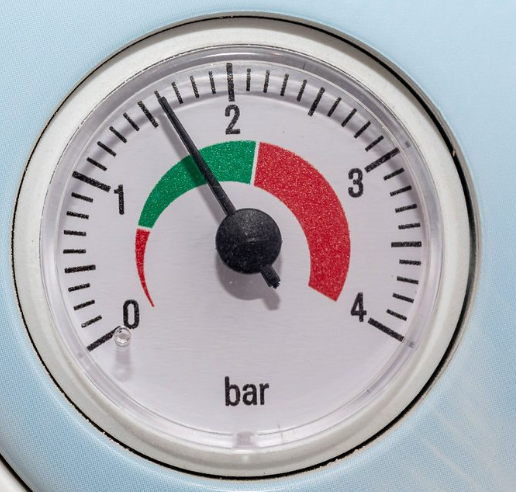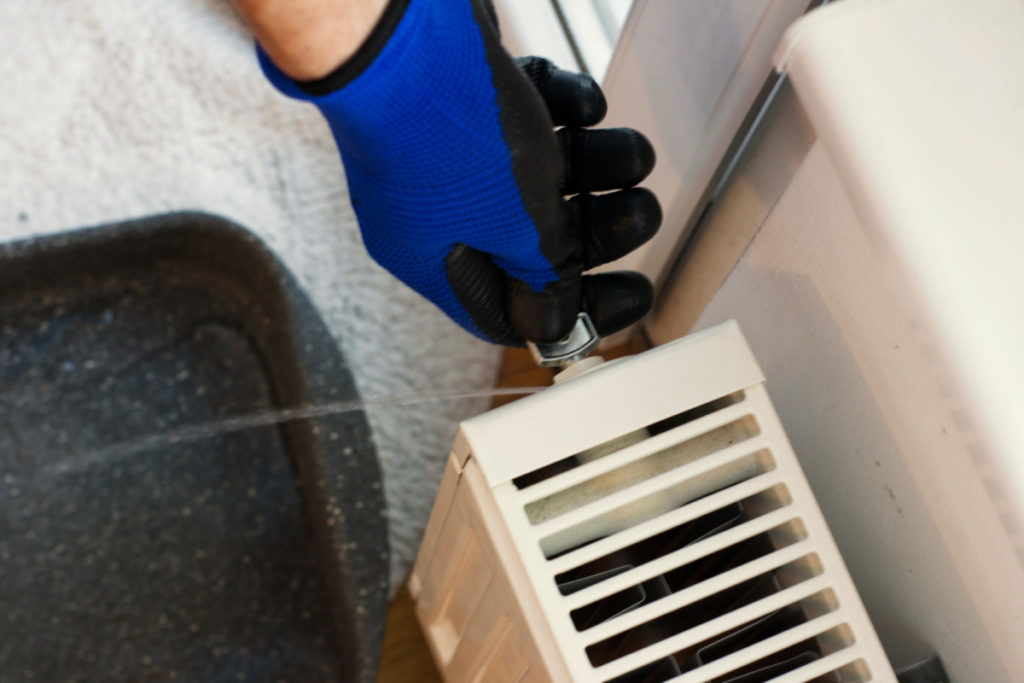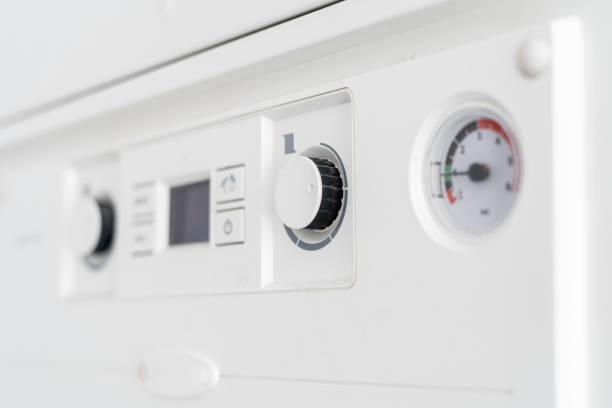As the cold weather sets in, its important to ensure that your home heating system is working efficiently. One of the key components of any heating system is the boiler, and a crucial factor that determines its effectiveness is the boiler pressure. The ideal boiler pressure can vary depending on the type of heating system you have, and maintaining the right pressure is essential to ensure that your home stays warm and comfortable during the colder months.
Table of Contents
In this blog post, we will explore what boiler pressure is, why it is important, and what the ideal boiler pressure is for different types of heating systems. We will also provide some tips on how to check and maintain your boiler pressure to keep your home warm and energy-efficient.

What is boiler pressure?
Boiler pressure is the pressure of the hot water that circulates through your heating system. The pressure of your heating system is usually displayed on the pressure gauge located on your boiler. It is vital that you keep an eye on your boiler pressure as it can directly affect the efficiency of your heating system.
Boiler pressure is measured in units of pressure known as ‘bars’, and the ideal pressure for your heating system is usually between 1 and 1.5 bars. However, this can vary depending on the type of heating system and boiler you have installed.
If your boiler pressure is too high, this can cause damage to your heating system and could lead to leaks, damage to the boiler or even a boiler breakdown. On the other hand, if your boiler pressure is too low, your heating system may not work efficiently, and you may experience a reduction in the amount of heat produced.
It is essential to regularly check your boiler pressure and adjust it accordingly if necessary. If you are unsure about how to check your boiler pressure or how to adjust it, it is always best to consult with a professional heating engineer to ensure that your heating system is operating safely and efficiently.
What is the ideal boiler pressure range?
The ideal boiler pressure can vary depending on the specific type of boiler and heating system. Maintaining the proper pressure range is essential for your boiler to operate efficiently and safely.
This section provides the recommended pressure ranges for different common boiler systems:
Condensing Boilers
Condensing boilers are high-efficiency boilers that use hot flue gases to pre-heat the cold water entering the boiler. They are the most common type of boiler installed in UK homes today.
The typical range for condensing boiler pressure is:
- Minimum: 1 bar
- Maximum: 1.5 bar
- Optimal: 1-1.2 bar
Combination (Combi) Boilers
Combi boilers provide hot water and heating on demand without a hot water storage cylinder.
The ideal pressure range for combi boilers is:
- Minimum: 1 bar
- Maximum: 1.2 bar
- Optimal: 1-1.1 bar
System Boilers
System boilers require a hot water storage cylinder to provide hot water.
System boiler pressure should be:
- Minimum: 1 bar
- Maximum: 1.5 bar
- Optimal: 1-1.2 bar
Conventional (Regular) Boilers
Conventional boilers heat water that is then stored in a hot water cylinder.
For conventional boilers, the recommended range is:
- Minimum: 1 bar
- Maximum: 2 bar
- Optimal: 1-1.5 bar
The ideal boiler pressure can vary depending on the specific type of boiler and heating system. Maintaining the proper pressure range is essential for your boiler to operate efficiently and safely.
This table provides the recommended pressure ranges for different common boiler systems:
| Boiler Type | Minimum Pressure | Maximum Pressure | Optimal Pressure Range |
|---|---|---|---|
| Condensing Boiler | 1 bar | 1.5 bar | 1-1.2 bar |
| Combination (Combi) Boiler | 1 bar | 1.2 bar | 1-1.1 bar |
| System Boiler | 1 bar | 1.5 bar | 1-1.2 bar |
| Conventional (Regular) Boiler | 1 bar | 2 bar | 1-1.5 bar |
Checking your boiler’s pressure gauge regularly is advised to ensure it stays within the proper range. Contact a Gas Safe registered engineer if you are unsure about your boiler type or appropriate pressure levels.
Ideal boiler pressure should be between 1 – 1.5 bar when the heating system is cold. This is indicated by a pressure gauge on the front of the boiler.
If the pressure is below 1 bar, the boiler may stop working and you’ll lose heating and hot water. Low pressure can be caused by a leak in the system or bleeding radiators. It’s easy to increase boiler pressure yourself via the filling loop. Slowly open the valves until the pressure reaches 1 – 1.5 bar, then close them.
If the boiler pressure is above 1.5 bar when cold, it is too high. This can happen if too much water was added or if valves were left open. Reduce pressure by bleeding radiators one by one and checking the gauge, opening a drain off valve to release water, or opening the pressure relief valve.
Getting the boiler pressure within the optimal range of 1 – 1.5 bars ensures your boiler runs efficiently. Check it occasionally and top it up or reduce it if needed. If pressure problems persist, a boiler service can identify and repair any faults.
Why is boiler pressure important?
Boiler pressure is a crucial aspect of your home heating system. The boiler needs a specific amount of pressure to function properly and efficiently. If the pressure is too low, the boiler won’t be able to heat your home efficiently, and you’ll likely experience a decrease in heat output. On the other hand, if the pressure is too high, it can lead to leaks or even cause damage to the boiler itself.
In addition to reduced efficiency or potential damage, incorrect boiler pressure can also cause safety issues. Low pressure can lead to gas leaks, while high pressure can increase the risk of an explosion. Therefore, it’s important to regularly check your boiler’s pressure.
Boiler pressure can affect the lifespan of your boiler. If the pressure is too high, it can cause the boiler to wear out more quickly, leading to costly repairs or even a complete replacement. Regularly monitoring and maintaining the correct boiler pressure can help prolong the life of your boiler and save you money in the long run.
The ideal boiler pressure range is between 1 and 1.5 bar. The pressure gauge located on your boiler will show the current pressure and should be checked periodically. If the pressure drops below 1 bar, then you may have a problem with your heating system, and if it exceeds 2.75 bars, then it’s too high and could be dangerous.
If you find that your boiler pressure is consistently too low or too high, then you should contact a qualified heating engineer to investigate the issue further. It’s always better to be safe than sorry when it comes to your home heating system, so make sure you keep an eye on the pressure gauge and take action if required.
How to check your boiler pressure
Checking your boiler pressure is a simple task that you can do yourself without the need for any professional assistance. To start, you need to locate the pressure gauge on your boiler. The pressure gauge is usually located on the front panel of your boiler and is often a round dial with numbers ranging from 1 to 4 or 5. Once you’ve located the gauge, you can check the pressure by following these simple steps:
- Turn off your boiler and allow it to cool down for a few minutes.
- Locate the filling loop, which is usually a silver flexible pipe with two valves on each end.
- Open both valves on the filling loop to allow water to flow into the system.
- Keep an eye on the pressure gauge and close both valves once the pressure reaches the desired level.
- Turn on your boiler and check the pressure gauge again to ensure that it’s within the recommended range.
It’s important to note that the recommended pressure level for your boiler may vary depending on the make and model of your boiler. Always refer to your boiler’s manual or consult a qualified heating engineer if you’re unsure about the ideal pressure level for your boiler. Checking your boiler pressure regularly can help you to maintain the efficiency of your heating system and avoid costly breakdowns.
Troubleshooting Boiler Pressure Problems
This section provides tips on diagnosing and fixing common boiler pressure issues.
Low Boiler Pressure
Low pressure occurs when the gauge reading drops below the minimum recommended level. This can cause the boiler to shut down and lead to a lack of heating or hot water.
Potential causes of low boiler pressure include:
- Leaks – Check for any visible water leaks on pipes, radiators, valves etc.
- Faulty pressure relief valve – Valve fails to close properly allowing pressure to escape.
- Bleeding radiators – Removing trapped air can reduce water level and pressure.
- Lack of water – Pressure drops if water level is too low.
To fix low pressure:
- Identify and repair any leaks.
- Top up water to normal level using the external filling loop.
- Bleed radiators to remove trapped air after refilling.
- Check pressure relief valve is closing properly.
- Contact an engineer if issues persist.
High Boiler Pressure
If pressure rises above the maximum recommended level, it can cause the boiler to shut off for safety.
High boiler pressure is typically caused by:
- Too much water added via filling loop.
- Filling loop left open with water flowing in.
- Faulty expansion vessel unable to handle increased water volume.
- Blocked pressure relief valve.
To reduce high boiler pressure:
- Ensure filling loop is fully closed.
- Bleed radiators one by one to release excess water.
- Open pressure relief valve to release pressure buildup.
- Have expansion vessel checked by an engineer.
- Contact an engineer if high pressure persists.
Routine boiler pressure checks and following manufacturer guidelines can help identify and resolve issues promptly. Call a Gas Safe registered engineer for assistance if needed.
Increasing Boiler Pressure
If pressure is too low, below the minimum recommended level, you can add more water to increase it.
- Turn the boiler power off and allow the system to fully cool.
- Locate the filling loop, usually connected by a braided hose with two valves.
- Connect the filling loop if your system has a detachable hose.
- Open both valves slowly on the filling loop.
- When pressure gauge shows optimal pressure (e.g. 1-1.5 bar), close both valves.
- Disconnect and remove the filling loop. Replace any caps.
- Turn boiler power back on.
- Allow boiler to heat up, then check pressure again. Add more water if needed.
Decreasing Boiler Pressure
If pressure is too high, carefully release water to reduce it.
- Turn boiler power off and allow system to fully cool.
- Bleed radiators – open bleed valves one by one to release water until pressure drops to normal range.
- Check pressure gauge and repeat bleeding more radiators if needed.
- Alternatively, open pressure relief valve to quickly reduce high pressure.
- If pressure remains too high, contact an engineer to inspect system.
Following manufacturer’s instructions and regular pressure checks can help identify and prevent issues. Contact a Gas Safe registered engineer if problems persist.

Common causes of low or high boiler pressure
Low or high boiler pressure can be a major problem for your heating system and can cause significant damage if not addressed promptly. There are several common causes of low or high boiler pressure that you should be aware of.
One of the most common causes of low boiler pressure is a leak in the system. This can be caused by a damaged valve, a faulty connection, or a cracked pipe. If you suspect a leak, you should have it repaired immediately to prevent further damage.
Another common cause of low boiler pressure is a faulty pressure relief valve. This valve is designed to release excess pressure from the system, but if it is not working correctly, it can cause the pressure to drop too low.
On the other hand, high boiler pressure can be caused by a buildup of minerals and other debris in the system. This can be caused by hard water or a lack of proper maintenance. High pressure can also be caused by a faulty pressure relief valve, so it’s important to have this checked regularly.
Risks of having low or high boiler pressure
Low boiler pressure can cause your heating system to stop working altogether, leaving you without heat and hot water. It can also cause your boiler to overheat, leading to potential damage and even failure. A common cause of low boiler pressure is a leak in the system, which can be difficult to detect and repair, resulting in increased energy bills.
On the other hand, high boiler pressure can cause your system to make loud banging noises and even leak water. This can result in damage to your boiler and central heating system, leading to expensive repairs. High boiler pressure can also cause your system to shut down, leaving you without heat and hot water.
It’s important to check your boiler pressure regularly and ensure it is within the recommended range. If you notice any problems with your boiler pressure, it’s best to call a qualified heating engineer to diagnose and fix the issue promptly. By keeping your boiler pressure at the ideal level, you can ensure your heating system is working efficiently and safely, saving you money and providing you with peace of mind.
How to maintain the ideal boiler pressure

Maintaining the ideal boiler pressure is key to ensuring your home heating system works efficiently and effectively. If the pressure is too low, your radiators won’t heat up properly, and if it’s too high, your boiler could be at risk of damage. So, how can you maintain the ideal boiler pressure?
If the pressure is too high, on the other hand, you’ll need to bleed the radiators to release excess air. This can be done using a radiator key, which is inserted into the valve at the top of the radiator. Turn the key clockwise to release the air, and keep an eye on the pressure gauge as you do this.
By checking the pressure gauge regularly and maintaining the ideal boiler pressure, you can ensure that your home heating system runs smoothly and efficiently, keeping you warm and comfortable throughout the year.
Conclusion
In conclusion, the ideal boiler pressure for your home heating system is dependent on a few factors. These factors include the type and model of your boiler, the size and layout of your home, and the type of radiators or underfloor heating you have installed.
It’s important to regularly check your boiler pressure to ensure it is operating efficiently and effectively. A pressure gauge can be found on your boiler and should read between 1 and 1.5 bars when the system is cold.
If you notice your boiler pressure is consistently too high or too low, it’s best to call a qualified heating engineer to diagnose and fix the issue. Neglecting to maintain the correct boiler pressure can lead to reduced efficiency and increased wear and tear on your heating system components.
Remember to also bleed your radiators regularly to ensure they are working at their optimal levels and to prevent any cold spots or reduced heat output.
By following these tips and regularly maintaining your boiler and heating system, you can ensure it operates efficiently and effectively, keeping your home warm and comfortable throughout the year.
FAQs
This section answers some frequently asked questions about boiler pressure.
What is the ideal pressure for my boiler?
- The optimal range is typically between 1-1.5 bar. Check manufacturer guidelines for your particular boiler model.
Why does my boiler pressure keep dropping?
- Frequent drops likely indicate a leak in the system. Check for visible water leaks around pipes and radiators.
Is high or low boiler pressure dangerous?
- Not necessarily, but very high or low readings can cause damage over time. The system has safety controls, but improper pressure should be addressed.
How often should I check boiler pressure?
- Pressure should be checked about once a month when the heating is off and boiler is cold. Also check after bleeding radiators or topping up system.
Can I increase pressure myself?
- Yes, use the external filling loop to safely add water and increase low pressure. Follow manufacturer instructions.
How do I decrease high boiler pressure?
- You can carefully bleed radiators or open the pressure relief valve to release excess water and reduce high pressure.
When should I call for professional help?
- If you cannot identify/resolve the issue causing abnormal pressure, or if pressure problems persist, contact a Gas Safe registered engineer for assistance.
Monitoring boiler pressure and seeking help when needed ensures your system operates efficiently.
